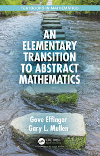- About MAA
- Membership
- MAA Publications
- Periodicals
- Blogs
- MAA Book Series
- MAA Press (an imprint of the AMS)
- MAA Notes
- MAA Reviews
- Mathematical Communication
- Information for Libraries
- Author Resources
- Advertise with MAA
- Meetings
- Competitions
- Programs
- Communities
- MAA Sections
- SIGMAA
- MAA Connect
- Students
- MAA Awards
- Awards Booklets
- Writing Awards
- Teaching Awards
- Service Awards
- Research Awards
- Lecture Awards
- Putnam Competition Individual and Team Winners
- D. E. Shaw Group AMC 8 Awards & Certificates
- Maryam Mirzakhani AMC 10 A Awards & Certificates
- Two Sigma AMC 10 B Awards & Certificates
- Jane Street AMC 12 A Awards & Certificates
- Akamai AMC 12 B Awards & Certificates
- High School Teachers
- News
You are here
An Elementary Transition to Abstract Mathematics

Publisher:
CRC Press
Publication Date:
2019
Number of Pages:
292
Format:
Hardcover
Price:
99.95
ISBN:
9780367336936
Category:
Textbook
[Reviewed by , on ]
Duane Graysay
05/24/2022
This volume is a textbook most suited to an audience of mathematics majors in mid-level courses designed for the transition point from computational courses (i.e., calculus and linear algebra) to proof-oriented upper-division courses. The book would be a strong choice as a textbook for such a course. The authors address two intertwined goals in the text: a) introducing students to rigorous proof and proof techniques, and b) engaging students in establishing, via rigorous proof, foundational theorems in set theory, number theory, and abstract algebra. To engage with the contents, a student must have completed at least a first course in calculus -- in the initial chapters the authors use familiar concepts from precalculus and introductory calculus to motivate for students an understanding of the need for proof in mathematics. Subsequent chapters gradually increase in formality, while exhorting the reader to continue to actively engage with the topics by working through examples and exercises.
Across the chapters the authors provide formal definitions and rigorous proofs of essential theorems while maintaining a conversational narrative style. With each definition and each theorem in the text, the authors include numerous concrete examples to help students understand the nature of the defined objects and the implications of theorems. The authors provide many exercises for students to further develop their understanding of the content of each chapter. In many respects, the book is similar to other volumes written for the same audience. However, the authors have included content related to the Diffie-Hellman Key Exchange and RSA encryption, which are timely topics that are not necessarily standard for comparable texts.
The authors note in their preface that the book is not intended to serve as a core text for the contents of the chapters – for example, the authors specifically note that a course in abstract algebra would include substantial content beyond what is offered by this text. However, the book will provide students with an appropriately rigorous anchoring that would be extended through more content-specific introductory courses.
Dr. Duane Graysay is an Assistant Professor of Mathematics Education at Syracuse University. Dr. Graysay teaches methods courses for secondary pre-service mathematics teachers and undergraduate mathematics courses for majors and non-majors.
See the publisher's website.
- Log in to post comments




